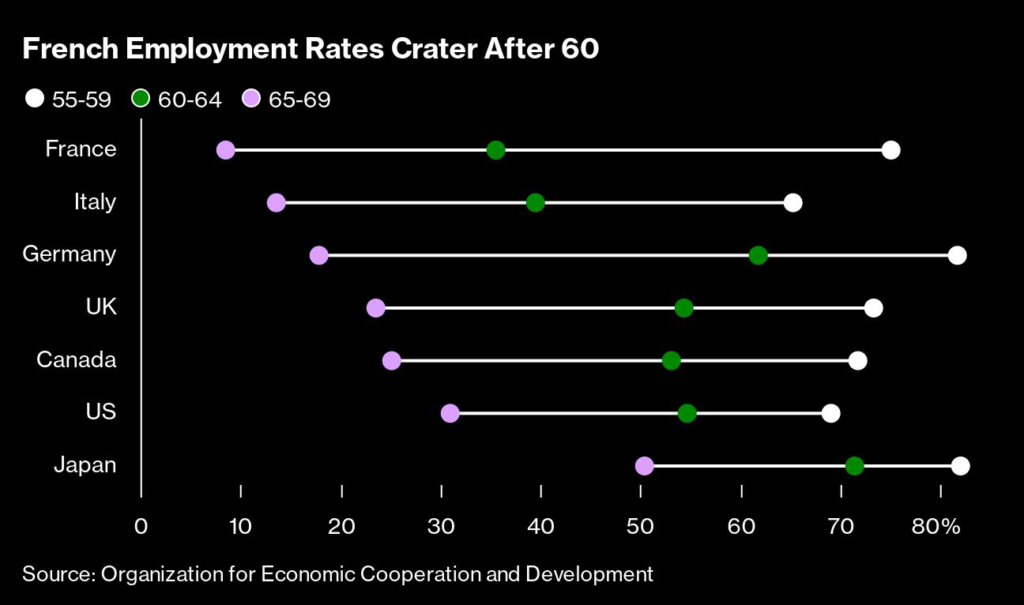The biggest protest of Emmanuel Macron’s time in office is setting the stage for a prolonged, legacy-defining battle over pension reform for the French president as neither he nor labor unions are leaving room for compromise.
(Bloomberg) — The biggest protest of Emmanuel Macron’s time in office is setting the stage for a prolonged, legacy-defining battle over pension reform for the French president as neither he nor labor unions are leaving room for compromise.
More than a million people took to the streets on Thursday, led by labor unions opposing the 45-year-old leader’s plan to eliminate deficits in the pension system by raising the minimum retirement age to 64 from 62.
Emboldened by broad public opposition, unions called for more action and disruption when the government presents its plan to the cabinet on Monday. They will hold another day of coordinated strikes and protests Jan. 31.
“This reform is unacceptable and against the interests of the population,” the labor unions said in a joint statement. “We are determined to have a fair retirement system, financed by a different way of sharing wealth.”
Efforts to overhaul the pension system by getting the French to work longer have often been the undoing of previous governments, who’ve been forced to back down in the face of protests that paralyzed the country. Now, a protracted confrontation will test the resolve of Macron, who has pitched pension reform as a vital step in his pro-business overhaul of the French economy.
“We strongly believe that this reform is a necessity for France,” Finance Minister Bruno Le Maire told Bloomberg Television’s Francine Lacqua at the World Economic Forum in Davos on Friday. “So we will stick to that reform even if, of course, there will be a debate in the French parliament. There might be some improvements of the reform.”
Forging ahead despite resistance would expend political capital at a time when Macron is already weakened without a majority in parliament. But backing down would put in doubt his credentials as a pro-business reformer and add risks to public finances, which are under pressure from record debt burden nearing 114% of economic output.
Key to Macron’s next steps is whether unions can hang on to the backing they have for strikes and protests. Opinion polls indicate that for now they have huge support among the wider French population, with a poll by Ifop for Sud Radio showing Thursday that only 28% back the pension-reform plan.
Also fueling the unions’ momentum is the rare unity on the issue of France’s normally fragmented labor movements. They haven’t joined forces to this extent since protests against former President Nicolas Sarkozy’s 2010 pension reform, according to Jean Grosset, director of the social dialogue observatory at think tank Fondation Jean Jaures.
Sarkozy’s popularity never recovered and the center-right president was beaten in the 2012 election by Socialist Francois Hollande, who pledged to roll back some of the changes.
“The reform passed, but it sent a shock wave through the country for eight to 10 months,” Grosset said. “The government paid a high political price.”
In 1995, Prime Minister Alain Juppe abandoned his pension-reform plan after strikes brought the country to a halt for about a month.
Macron has already backed down once on pensions, dropping a 2019 plan to streamline the country’s byzantine systems after some of the longest transport strikes in its history. His government at the time said it hit pause and then abandoned the plan because of the Covid pandemic.
But this time, Macron has indicated he won’t budge. He argues that making the French work longer is essential to boost relatively low employment rates among seniors and avoid persistent deficits in a public system funded by worker contributions.
Read more: Why Macron Is Risking a Wave of Unrest Over Pensions: QuickTake
While his government has indicated there could be minor tweaks to the plan when it is debated in parliament in February and March, it also says any changes must be financed, making it unlikely the change in retirement ages could be scrapped.
“For the pact between generations to be fair, this reform needs to be implemented,” Macron said on Thursday. “So we’ll do it with respect and in dialogue, but determination and a sense of responsibility”
–With assistance from Ania Nussbaum, Samy Adghirni and Francine Lacqua.
(Adds comment from Le Maire in sixth paragraph.)
More stories like this are available on bloomberg.com
©2023 Bloomberg L.P.










